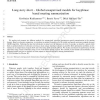602 search results - page 56 / 121 » Unsupervised Problem Decomposition Using Genetic Programming |
139
Voted
INFSOF
2008
15 years 1 months ago
2008
This paper introduces an approach to locating dependence structures in a program by searching the space of the powerset of the set of all possible program slices. The paper formul...
128
click to vote
GECCO
2003
Springer
15 years 7 months ago
2003
Springer
We present the result of our work on use of genetic programming for evolving social behavior of agents situated in inherently cooperative environment. We use predators-prey pursuit...
128
Voted
SPEECH
2010
14 years 9 months ago
2010
act 11 We analyze and compare two different methods for unsupervised extractive spontaneous speech summarization in the meeting 12 domain. Based on utterance comparison, we introdu...
141
Voted
EUROGP
2007
Springer
15 years 8 months ago
2007
Springer
This work analyzes fitness landscapes for the image filter design problem approached using functional-level Cartesian Genetic Programming. Smoothness and ruggedness of fitness l...
113
click to vote
COR
2010
15 years 2 months ago
2010
In many real-life optimisation problems, there are multiple interacting components in a solution. For example, different components might specify assignments to different kinds of...

